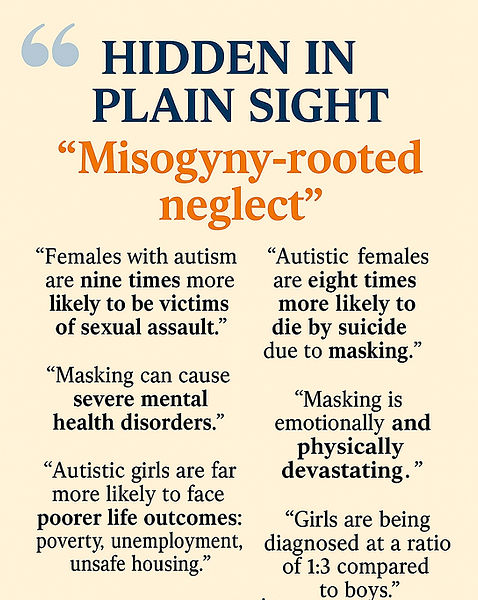
Why This Matters


For too long, autism in women and girls has been hidden in plain sight. Decades of research, diagnostic criteria, and professional training were built on a male model of autism, leaving females misdiagnosed, overlooked, and misunderstood. This is not a small oversight — it is a systemic failure that has caused generations of women and girls to suffer needlessly.
At Spectrum Sisters, we believe this is not only a health and social care issue — it is a feminist issue.
Hidden in Plain Sight
Girls are often taught to mask from a young age — to smile when they are uncomfortable, to mimic their peers, and to “fit in” at any cost. These survival strategies mean that teachers, doctors, and even families may not recognise their struggles. Behind the mask, many girls experience anxiety, isolation, and trauma.
Because the male model of autism dominates clinical understanding, countless girls grow up without the recognition or support they need. By the time they reach adulthood, they may have a history of misdiagnosis — often told they have borderline personality disorder, bipolar disorder, or depression. Many describe years of being dismissed, invalidated, or even pathologised.
This neglect is not accidental. It is rooted in misogyny — the systemic devaluing of women’s experiences, the dismissal of their voices, and the minimisation of their pain.
A Feminist Issue
When women’s health and wellbeing are ignored, the consequences ripple across every part of society. Autistic women and girls face:
- Higher rates of misdiagnosis and late diagnosis.
- Increased vulnerability to domestic abuse, sexual exploitation, and coercive control.
- Elevated risk of mental health struggles, including depression, PTSD, and suicide.
- Barriers to education, employment, and healthcare.
This is not just a failure of services. It is misogyny-rooted neglect. Women and girls with autism have been systematically excluded from research, overlooked in clinical practice, and denied the right to timely recognition.
Recognising female autism is therefore an act of justice — a step towards dismantling systemic neglect and affirming that women and girls matter.
Our Girls Are Being Left Behind
Every year that this issue is ignored, more girls fall through the cracks. They are the quiet child in the classroom who is labelled “shy” instead of supported. They are the teenager struggling silently with eating disorders or self-harm, misunderstood by professionals. They are the women misdiagnosed for decades, only receiving answers after a lifetime of pain.
This is not just about diagnosis — it is about preventing harm. It is about giving autistic girls the chance to flourish, to be seen, and to be safe.
Why We Must Raise Awareness
Awareness is not optional. It is urgent. We need:
- Training reform across healthcare, education, and social work.
- Research that centres on the female autistic experience.
- Policies and legislation that ensure girls and women are not left behind.
- Services designed to affirm neurodiverse women and girls, not marginalise them further.
Many assessment tools and providers still fail to recognise the female presentation of autism. Most professionals are trained using male-centred models, which means women and girls are often overlooked or misdiagnosed. It is therefore crucial that clients seeking assessment for a girl or woman choose a provider who truly understands the female autistic profile. Without this, there is a risk of continued neglect, invalidation, and harm.
Our Commitment
Spectrum Sisters exists because this neglect cannot be allowed to continue. We are committed to:
- Providing assessments that truly reflect the lived experiences of women and girls.
- Advocating for systemic change across health, education, and social care.
- Speaking openly about the feminist nature of this issue.
- Supporting women and girls not just to survive, but to thrive.
Final Note
This is not just about autism. It is about equality. It is about justice. It is about ending the systemic neglect of women and girls who have been hidden in plain sight for far too long.
Autistic women and girls deserve to be recognised, respected, and supported. Anything less is neglect. Anything less is unacceptable.